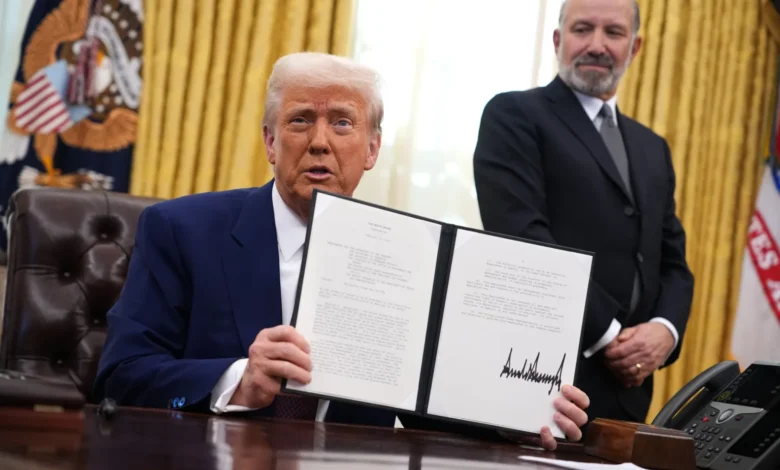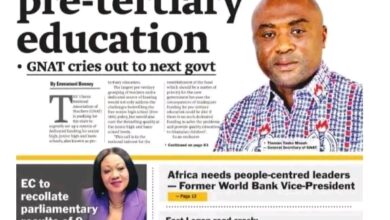Trump announces ‘reciprocal’ tariffs across the globe

Trump Unveils Plan to Impose New Tariffs Targeting Trade Disparities
American President Donald Trump has launched a strategic initiative aimed at imposing new tariffs on exports from countries he believes engage in unfair trade practices with the United States. On Thursday, Trump signed a memorandum directing his administration to design customized tariffs for each trading partner, considering factors such as existing tariffs, exchange rates, trade balances, and other regulatory frameworks.
The White House emphasized that foreign tariffs are not the sole concern, highlighting other policies particularly those of the European Union that allegedly disadvantage U.S. exporters. Although many details remain unclear, the announcement is expected to prompt a wave of international trade negotiations.
Trump framed the initiative as part of his broader effort to stimulate domestic investment and enhance U.S. manufacturing. “If you build your product in the United States, there are no tariffs,” Trump explained, insisting that his plan is about restoring fairness in global trade.
The presidential memo mandates that officials present a comprehensive “reciprocal trade and tariffs” strategy within 180 days. Commerce Secretary designate Howard Lutnick stated his team aims to submit their plan to the President by April 1.
He further claimed, “In almost all cases, they’re charging us vastly more than we charge them, but those days are over. This should have been done a long time ago.”
Key trade partners expected to be impacted include the European Union, India, Vietnam, and Thailand—countries with relatively high tariffs that rely heavily on U.S. markets. Trump announced his intentions just before meeting Indian Prime Minister Narendra Modi, emphasizing a stance of equal tariffs: “Whatever India charges us, we charge them.”
Meanwhile, officials from Thailand and Vietnam have indicated they are reassessing their trade policies with the U.S., while the European Union reiterated its commitment to maintaining close ties with the U.S. but expressed readiness to safeguard its interests.
Understanding Reciprocal Tariffs
Reciprocal tariffs are designed to impose equivalent duties on imports from countries whose tariffs on U.S. goods are deemed disproportionately high. Historically, the U.S. has promoted free trade with low average tariffs of 3.4%, compared to 5% in Europe, according to the World Trade Organization (WTO).
The White House criticized specific imbalances, such as the 10% tariff on U.S. cars entering Europe compared to the 2.5% tariff for European cars imported into the U.S. It also highlighted Brazil’s 18% tariff on ethanol versus the U.S.’s 2.5% rate on the same product.
Additionally, the administration expressed concerns over digital services taxes imposed by several countries, including Canada and the UK, which it argues unfairly target U.S.-based tech giants. The European Union’s Value Added Tax (VAT) system also came under scrutiny.
Economic Implications and Global Reactions
The announcement follows a series of tariff-related actions by Trump, including a 25% import tax on steel and aluminum, as well as a 10% tariff on all Chinese goods. Plans to impose 25% duties on imports from Canada and Mexico have been postponed until March.
Wall Street showed cautious optimism, with stocks rising due to the absence of immediate tariff implementations. However, economic analysts expressed mixed reactions.
John Cassidy, CEO of Red Cedar Investment Management, noted that the rapid succession of tariff announcements has created uncertainty but believes Trump is strategically leveraging a strong negotiating position.
Conversely, Alex Durante, an economist at the Tax Foundation, warned that escalating tariffs could provoke retaliatory measures and increase economic uncertainty for U.S. businesses. “We’re inching toward more and more tariffs with each coming week and further escalation of a trade war with other countries,” he remarked.
Trump has dismissed concerns over potential economic repercussions, arguing that the long-term benefits—such as increased domestic manufacturing—will outweigh any short-term price hikes. “Prices could go up somewhat short term, but prices will also go down,” he stated.
However, public sentiment remains skeptical. A recent Marquette Law School poll revealed that only 24% of Americans believe tariffs will benefit the U.S. economy, with concerns about potential inflation and rising costs of goods.
Conclusion
President Trump’s tariff initiative signals a bold move to recalibrate global trade relations, potentially reshaping economic dynamics worldwide. As countries respond and trade negotiations unfold, the implications for international commerce and the U.S. economy will be closely monitored.




